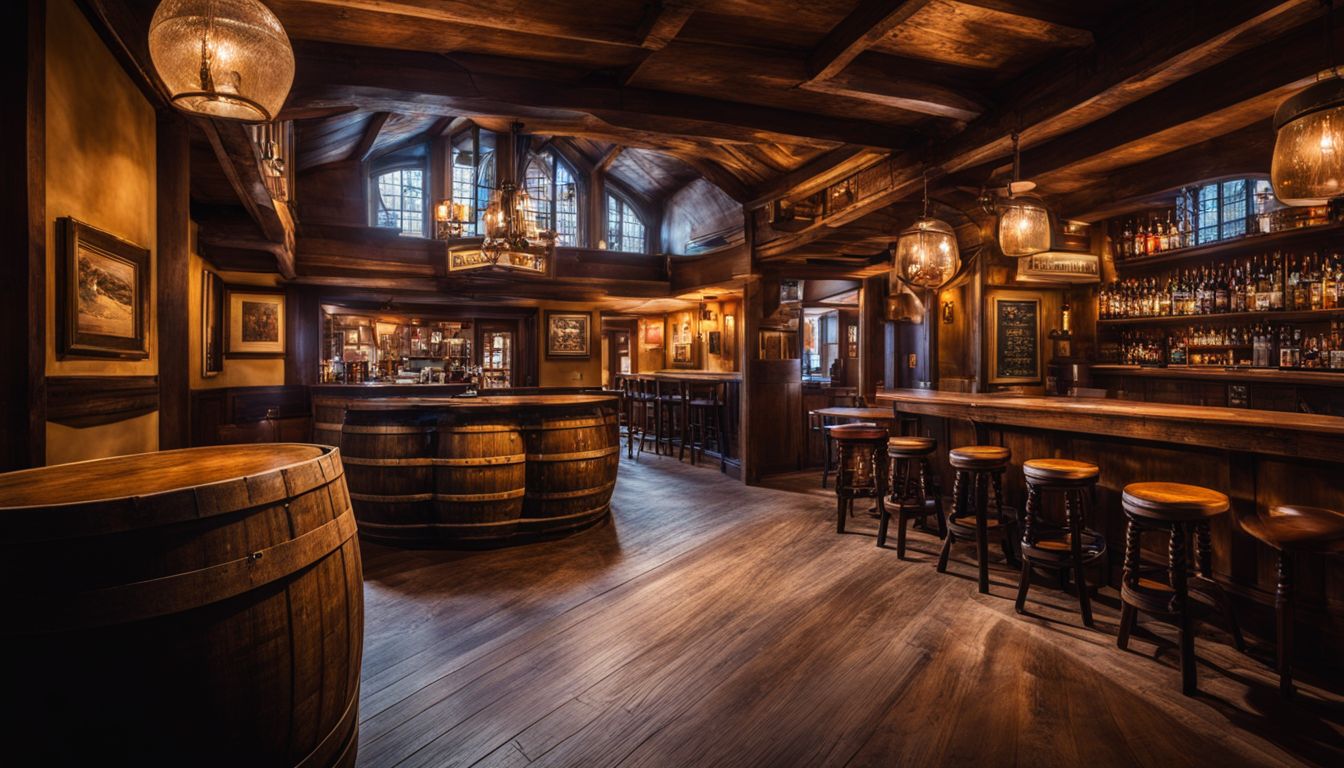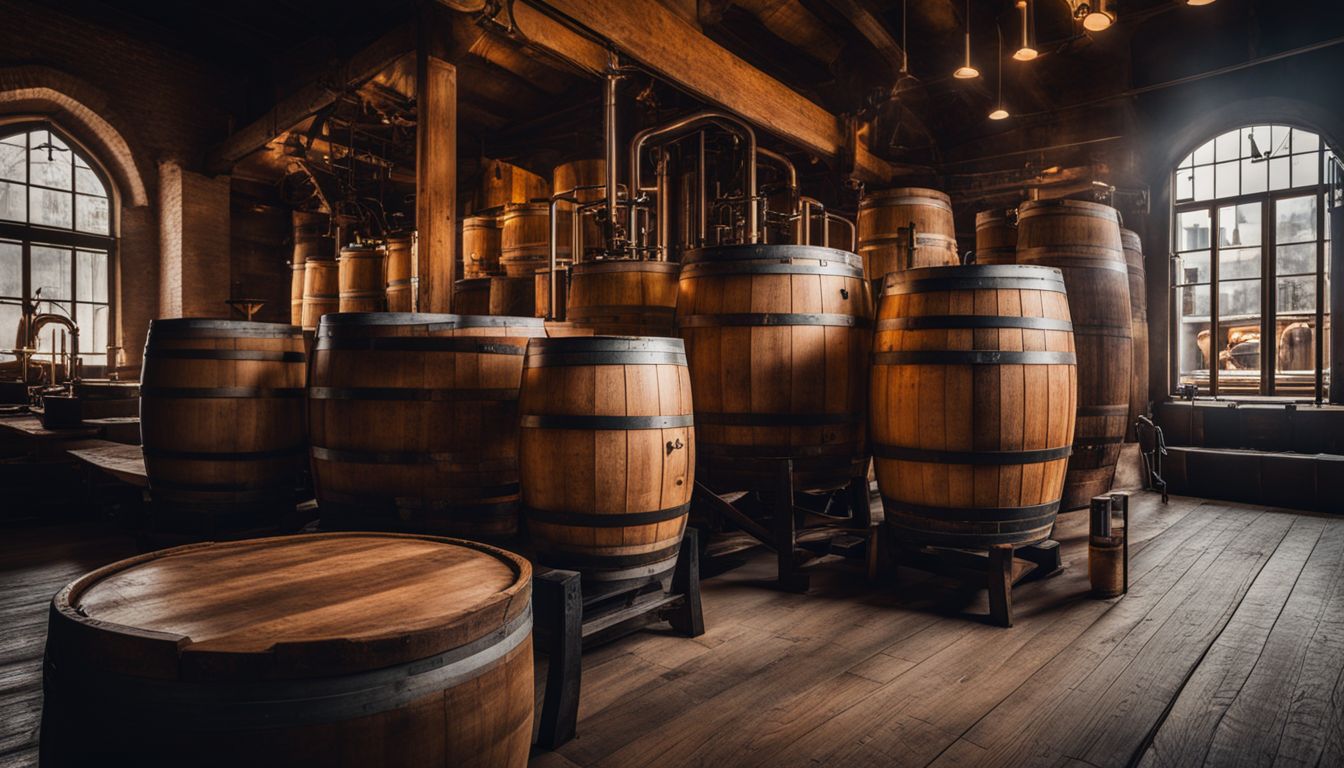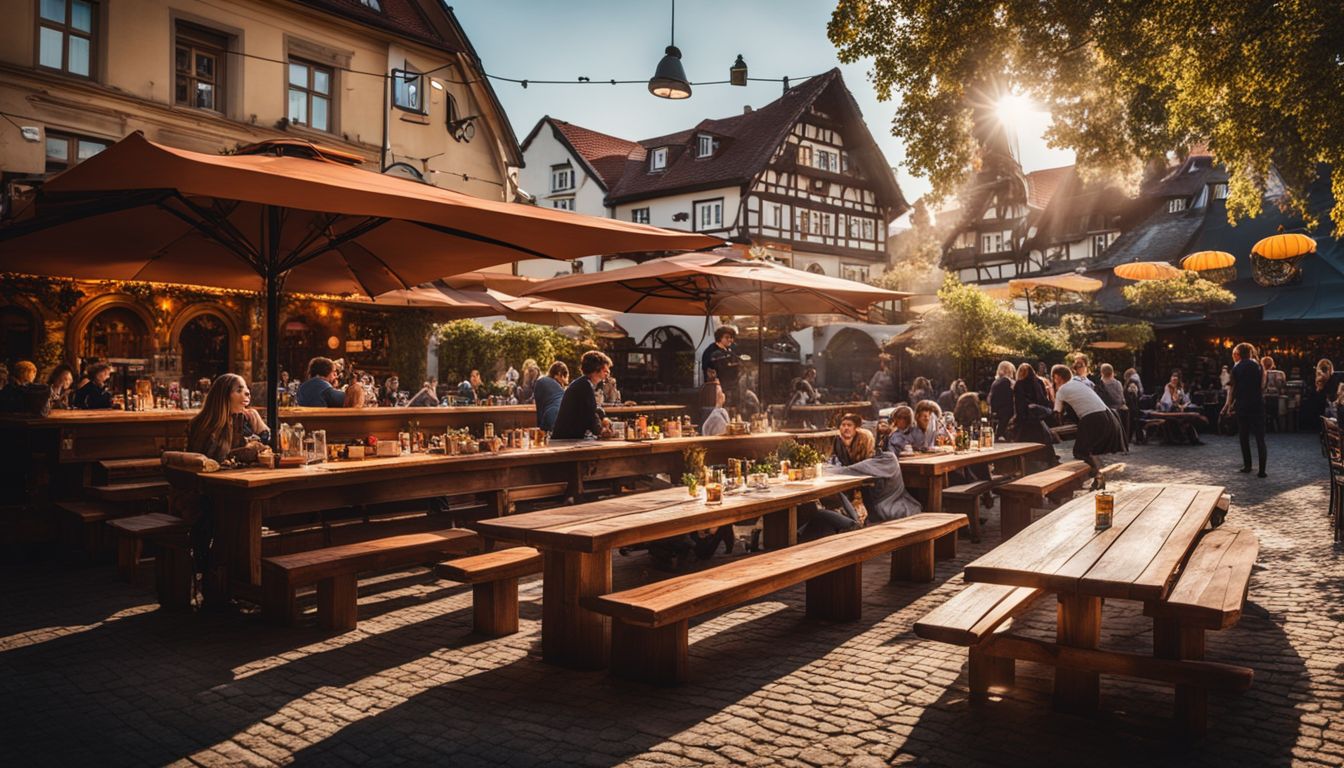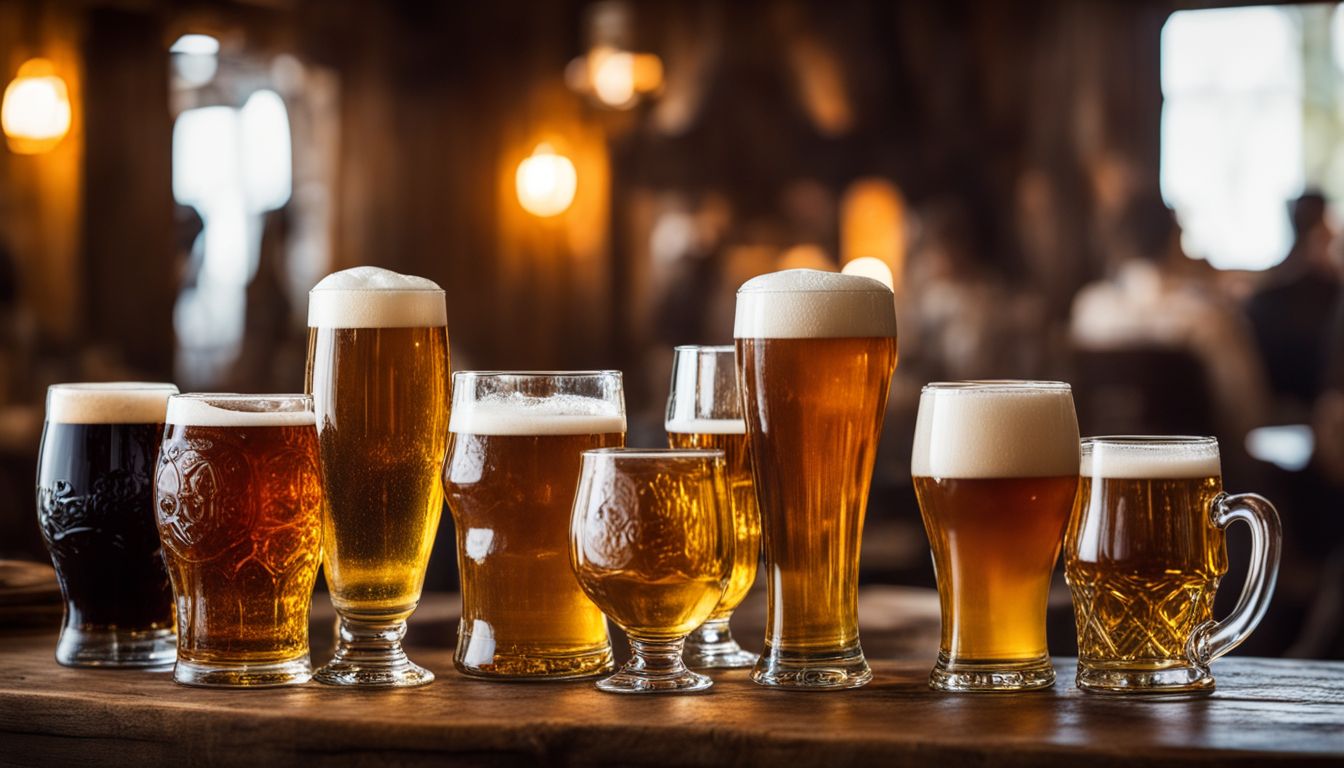Many people enjoy a cold beer but have you ever wondered about its cultural significance? Beer traces back to the dawn of civilization, influencing mankind over centuries. This blog explores how countries like Belgium, South Africa and more cherish their unique brewing traditions and the role beer plays in shaping their culture.
Dive in now, there is a world of hops and barley waiting for you!
Key Takeaways
- Beer has a long and rich history, dating back to ancient civilizations like Ancient Egypt and Mesopotamia.
- Different countries have their own unique beer cultures, reflecting local traditions, ingredients, and brewing techniques.
- Beer plays a significant role in shaping cultural practices and social interactions in various countries around the world.
- Beer festivals are important events that celebrate the cultural significance of this beloved beverage.
Beer Culture in Belgium

Belgium has a rich beer culture, with historical significance dating back centuries.
Historical significance

Beer was born long before us. It goes back to the early days when people first set up towns. Folk from Ancient Egypt and Mesopotamia started brewing beer. This cool drink soon spread all over the world, shaping how we live our lives today.
The Czech Republic loves beer so much that they drink more of it than any other place in the world! Every country has its own way to make beer, using stuff found nearby, like crops or water.
People have been enjoying beer for hundreds of years because of this rich past.
Role in daily life and festivities

In Belgium, beer is deeply intertwined with daily life and festivities. It holds a special place in the hearts of Belgians as they enjoy it in various social settings. Whether it’s a casual get-together with friends or a lavish celebration, beer is always present.
In fact, many Belgians have their favorite local breweries and take pride in the rich brewing heritage of their region. Beer plays an essential role during traditional festivals like Carnaval and Christmas markets, where people come together to celebrate while savoring different styles of Belgian beer.
It’s not just about drinking; beer also contributes to the local economy through tourism and job creation within the brewing industry.
Intangible cultural heritage

Beer is not just a drink, but it also holds a special place in the intangible cultural heritage of various countries. Brewing traditions and customs associated with beer have been passed down through generations, preserving unique knowledge and techniques.
Beer festivals and events celebrating this beloved beverage are an important part of many cultures around the world. The cultural significance of beer goes beyond its taste and consumption, as it brings people together, creates social connections, and showcases local traditions.
From Belgium to Germany to South Africa, beer has played a role in shaping cultural practices and social interactions for centuries.
Beer Culture in South Africa

South Africa has a vibrant beer culture with a strong emphasis on unique brewing traditions and its impact on the local community.
Importance and popularity

Beer is incredibly important and popular in many countries around the world. It has a long history and has been enjoyed by humans for centuries. Different countries have their own unique beer styles, reflecting local traditions, ingredients, and brewing techniques.
Belgium, for example, is known for its beer culture, with communities throughout the country making and appreciating beer as part of their daily life and festivities. South Africa also has a strong beer-drinking culture, with beer being an integral part of the country’s traditions and celebrations.
Beer is often consumed in social settings and plays a significant role in cultural traditions and social interactions. In fact, some countries even have special beer festivals that are an important part of their culture.
Unique brewing traditions

Different countries have their own unique brewing traditions when it comes to making beer. For example, Belgium is known for its diverse range of beer styles and brewing techniques.
They have a long history of brewing and take great pride in their traditional methods, such as spontaneous fermentation and barrel-aging. In South Africa, there are distinct local brewing traditions that use indigenous ingredients like sorghum or maize.
These unique brewing traditions highlight the cultural diversity and heritage associated with beer production around the world.
Impact on the local community

Beer has not only a cultural significance but also an impact on the local community. In Belgium, beer is deeply ingrained in daily life and festivities, contributing to the country’s social fabric.
Local breweries play a vital role in supporting the economy and preserving traditional brewing techniques. Similarly, in South Africa, beer plays a crucial role in community celebrations and traditions, bringing people together.
The consumption of beer fosters a sense of camaraderie at local pubs and contributes to the overall social atmosphere. In different countries around the world, beer festivals not only showcase diverse brewing traditions but also attract tourists who contribute to the local economy.
Beer Culture in Greece

In Greece, there has been a revival of local breweries and the country now boasts unique beer varieties that showcase its cultural significance. Interested in learning more about the impact of Greek beer on the local community? Read on!
Revival of local breweries

Local breweries are making a comeback in many countries, including Greece. After years of dominance by large commercial breweries, there is a growing interest in supporting local and independent brewers.
This revival of local breweries not only brings unique beer varieties to the market but also helps preserve cultural traditions and heritage. By brewing beer using traditional methods and locally sourced ingredients, these small-scale breweries contribute to the country’s culture.
They offer consumers a chance to explore new flavors while supporting their local economy. The revival of local breweries adds diversity to the beer industry, enriching the cultural tapestry of Greece and other countries around the world.
Unique beer varieties

Different countries have their own unique beer varieties, each reflecting local traditions and ingredients. For example, in Greece, there has been a revival of local breweries that produce distinctive beers using traditional brewing methods.
These beers showcase the country’s rich cultural heritage and are often made with indigenous ingredients such as herbs and spices. In Germany, you’ll find a wide range of beer styles, from light lagers to dark bocks.
Each region has its own specialty, like the wheat beers of Bavaria or the smoked beers of Bamberg. Exploring these unique beer varieties is not only a delicious experience but also an opportunity to learn about different cultures and their brewing traditions.
Cultural significance

Beer holds great cultural significance in various countries around the world. It has a rich history that dates back to ancient civilizations and has played a role in shaping cultural traditions and social interactions.
In Belgium, for example, beer is deeply ingrained in daily life and festivities, with communities throughout the country appreciating and celebrating different beer styles. Similarly, South Africa has a strong beer-drinking culture where it holds importance in local traditions and celebrations.
Different countries have developed their own unique beer styles, reflecting their local ingredients and brewing techniques. Beer festivals and events also contribute to its cultural significance by bringing people together to enjoy this popular beverage.
Overall, beer is more than just a drink; it is a symbol of national identity, a part of religious practices, and an important aspect of traditional cuisine in many cultures. The impact of beer extends beyond its consumption as it contributes to the local economy through brewing heritage and tourism associated with beer festivals.
Beer Culture in Germany

Germany has a rich and deeply-rooted beer culture, with beer playing a significant role in German society and serving as a symbol of national identity.
Historical and cultural importance
Beer holds significant historical and cultural importance in various countries around the world. From its ancient origins in civilizations like Ancient Egypt and Mesopotamia, beer has played a role in shaping human history.
It spread across different regions, contributing to the development of civilization itself. In Belgium, for example, beer culture is deeply rooted in daily life and festive celebrations.
South Africa also has a strong beer-drinking culture, where beer is intertwined with traditions and community events. Different countries have their own unique brewing styles and techniques that reflect local traditions and ingredients.
Beer as a symbol of national identity
Beer holds a special place as a symbol of national identity in many countries. For example, Germany is widely recognized for its beer culture, with brewing traditions that date back centuries.
Beer is not just a drink in Germany; it represents tradition, craftsmanship, and community. The country is known for its strict beer purity laws, which ensure that only specific ingredients are used in the brewing process.
This commitment to quality and authenticity has become an integral part of German national pride. In Belgium too, beer plays a crucial role in shaping the nation’s identity. With over 1,500 different beers and recognized by UNESCO as intangible cultural heritage, Belgian beers showcase the rich history and diversity of their brewing industry.
From Trappist beers brewed by monks to lambics fermented with wild yeasts, each beer style reflects Belgium’s unique heritage and contributes to its sense of national identity.
In South Africa, beer also holds significance as a symbol of unity and celebration among diverse communities. Traditional African beers like umqombothi are made using local grains such as maize or sorghum and are often shared during important gatherings and ceremonies.
These traditional brewing practices not only preserve cultural customs but also promote social cohesion within the community.
Around the world, beer continues to be more than just an alcoholic beverage – it serves as a representation of history, culture, traditions, national pride, social connections,
Impact on German society
Beer has had a significant impact on German society throughout history. It is not just a beverage, but also a symbol of national identity and cultural pride. Beer plays an important role in social gatherings and celebrations, bringing people together and fostering a sense of community.
In Germany, breweries are often family-owned businesses that have been passed down through generations, showcasing the connection between beer production and local economies. Additionally, beer is deeply ingrained in traditional cuisine, with many dishes being enjoyed alongside a cold glass of beer.
Overall, beer holds great importance in German society as it reflects their heritage, values, and traditions.
Cultural Significance of Beer Worldwide

Beer has ancient origins and has had a significant impact on civilizations throughout history, with a variety of brewing traditions and customs found in different countries.
Ancient origins
Beer has a rich history that dates back to the beginning of human civilization. It first emerged in ancient Egypt and Mesopotamia, spreading across the world and playing a crucial role in the development of different civilizations.
People have been enjoying beer for centuries, making it one of the oldest beverages known to mankind. Its popularity can be attributed to its taste, affordability, and availability.
Beer has not only been enjoyed for its refreshing qualities but has also played a significant role in shaping cultural traditions and social interactions in various countries around the globe.
Impact on civilizations
Beer has had a significant impact on civilizations throughout history. It played a role in the development and spread of civilization, starting from its origins in Ancient Egypt and Mesopotamia.
Beer was not only enjoyed for its taste, but it also provided hydration and nutrition to people in times when clean water sources were limited. The volume of beer consumption increased as civilizations grew, with brewing becoming an important part of daily life.
Beer also played a role in religious and ceremonial practices, bringing people together for celebrations and social gatherings. Its cultural significance can be seen in the variety of brewing traditions and customs that have developed around the world.
Variety of brewing traditions and customs
Different countries around the world have their own unique brewing traditions and customs when it comes to beer. Each country has its own special techniques, ingredients, and styles that make their beer distinct.
In Belgium, for example, there are over 1,000 different types of beer brewed by local communities. On the other hand, Germany is renowned for its strict adherence to traditional brewing methods, resulting in a wide range of delicious beers that reflect their rich cultural heritage.
From Ireland’s famous stout to South Africa’s sorghum-based brews, every culture has its own way of creating and enjoying this popular beverage. With such diversity in brewing traditions and customs globally, exploring the world of beer allows us to appreciate the richness and complexity of different cultures.
Conclusion

In conclusion, beer holds immense cultural significance in various countries around the world. From Belgium to South Africa, Greece to Germany, each country has its own unique beer culture and traditions that have evolved over centuries.
Whether it’s a symbol of national identity or a part of religious ceremonies, beer has played an integral role in shaping social interactions and fostering community connections. As we continue to explore the history and customs surrounding beer in different cultures, we gain a deeper understanding of how this beloved beverage unites people across borders and brings joy to their lives.
FAQs
1. How is beer culturally significant in different countries?
Beer is culturally significant in different countries because it is often associated with traditional celebrations, social bonding, and cultural identities.
2. What are some examples of the cultural significance of beer?
Examples of the cultural significance of beer include Oktoberfest in Germany, where people gather to celebrate and enjoy various types of beer, and Guinness in Ireland, which is closely tied to Irish heritage and St. Patrick’s Day festivities.
3. How does beer contribute to the social fabric of a community?
Beer contributes to the social fabric of a community by providing opportunities for people to come together, share experiences, bond over shared traditions or stories associated with specific beers or breweries.
4. Is beer consumption purely about enjoyment or does it have deeper meanings?
While beer consumption can certainly be enjoyed for its taste and relaxation purposes, it also has deeper meanings within cultures such as religious rituals, economic significance through brewing traditions or industries, and historical connections.
